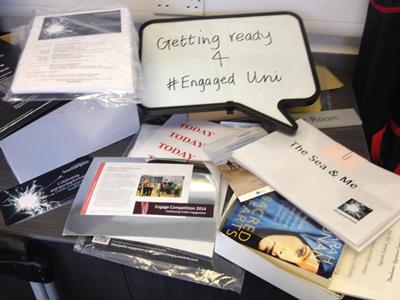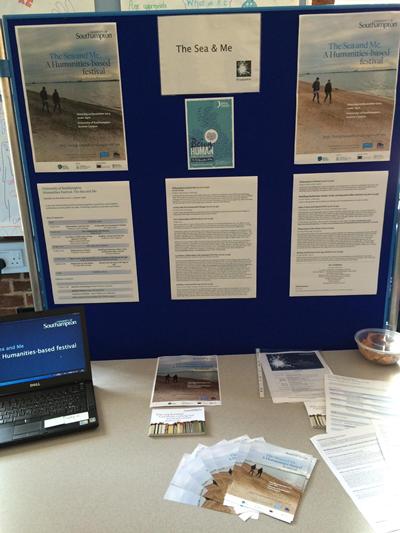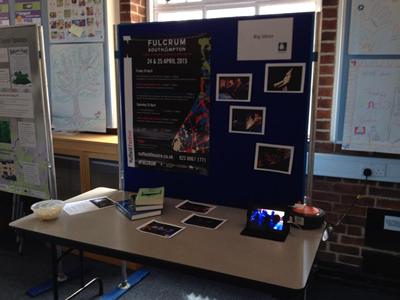Building on a previous event back in 2011, this one-day conference on 21 May 2015 enabled staff, postgraduate- and postdoc-researchers, and members of the public to come together for a lively programme of small group discussions, project showcases, and plenary discussions, to help shape Southampton's Engaged University agenda.
Check here again soon for news of how our findings from this day are to be taken forward.

Read more about the day on Storify.
Opening Key-note
Professor Ros King, (Engaged University Steering Group) opened the day with some personal reflections on the importance of engaged research. She emphasised the increasing Research Council emphasis on and expectation of inter-disciplinary and cross-disciplinary research, and how engagement can be a way to facilitate and enhance the exchange between disciplines, as well as with 'the outside world'. In the context of Southampton at this particular point, the arrival of the new Arts Quarter in the city centre in 2016 would be significant for both University and City, with particular potential for enhancing the visibility of the University. Ros made an appeal that the term 'science' be understood in the widest possible sense of 'intellectual enquiry'.
Session themes
Slides from some of the sessions are available to download below. The themes were:
Evaluating Engagement
Facilitated by Pearl John (Physics Outreach), Janice Griffiths (Maths and Science Learning Centre) and Marcus Grace (School of Education), this session drew on examples of evaluation from around the University and considered practical and methodological issues associated with different approaches. Through the pooling of existing expertise in the group, work has been started on a tool-kit for best practice. (link to where took-kit resources are put).
What does collaborative practice mean - and what can you expect when engaging in collaborative practice?
In this session, Chris Elmer (PhD researcher in public archaeology) and Dr Ruth Bartlett (Associate Professor in Health Sciences) drew on their own recent experiences of working collaboratively - Chris with a community archaeology project and Ruth with professional artists and people with dementia - to explore the process in terms of a public engagement activity. They drew on materials and ideas related to collaborative practice, such as 'public ethnography' to address some fundamental questions, such as 'how and why to collaborate?'; 'risks and how to mitigate them?'; 'what should I expect when I collaborate?'; 'how to begin to understand the impact of our collaborative enterprises?'.
Public Engagement & Outreach
This session outlined the varied opportunities currently available across the University for staff and students to get involved with outreach, and sought to explore the potential for participation in these activities to enhance both the research process and the impact of research. It was facilitated by Kirsten Whythe (UK Recruitment & Outreach Office), Lindsay Wager (Talk to Us, SUPI project), and Kath Woods-Townsend (Life-Lab).
Public Engagement in the curriculum
In this session, Joy Moloney (Faculty of Engineering) facilitated a discussion around the potential for a Curriculum Innovation (ie co-curricular) Module on Public Engagement.
Public Engagement and Research Impact: Making it work for you
Co-facilitated by Peter Staniczenko (RIS) and Clint Styles (Faculty of Engineering), this session reflected on the engagement and impact lessons learned from REF 2014, and explored the opportunities for generating impact from research, with a practical emphasis on how the University could best help researchers in this endeavour.
Public engagement in the digital environment
This session featured a number of potential digital platforms for engagement - online communities, moocs, web observatory project, and opportunities via the Worldwide University Network (WUN). The presenters were Eleanora Gandolfini (WUN), Kate Dickens (ILIaD), Lisa Harris (Business School), Sylvian Jesudoss (Digichamp), and Ian Brown (PGR WebSci).
What can we learn from Health? Exploring Patient & Public Involvement (PPI) for models of working and measuring impact
In this session, Dr Claire Ballinger and Mark Stafford-Watson (CLAHRC Wessex PPI) reflected on the benefits and value of the PPI model and how it might be transferrable to other research contexts.
Useful Downloads
- What can we learn from health? small group session handout
- PE & Research Impact - small group slides
- PE in the Curriculum - small group slides
- PE & Outreach - small group slide set 1
- PE & Outreach - small group slide set 2
Need the software?PDF Reader
Lunchtime Showcase
Over lunch there was an opportunity to find out more about the five Public Engagement Development projects which had been funded in 2014/15, alongside the three Southampton projects which were selected as finalists in the National Engage Awards 2014: Marine Engineering Connections; Erica the Rhino; and Celestial Sirens.


Panel presentations and discussion
Paul Manners (NCCPE) opened our panel session by reflecting on the journey of public engagement within higher education, the aspirations of universities (connected, engaged, problem-solving, world-changing) and the challenges posed by public perceptions (irrelevant, out of touch, secretive, untrustworthy, unaccountable, waste of public money, elitist and reinforcing inequality). These criticisms, he noted, were not peculiar to universities, but rather, were commonplace across publicly funded organisations (eg. Government, BBC). Indeed, citing the example of Sony, commercial companies were also not immune. Paul posed two provocative questions: Can engagement be grafted on to our activities, or do we need to transform the way we work? and How much public engagement is enough? Paul's slides are available for download below.
"Are you a Ghandi or a Don Juan of public engagement?" asked Tim Leighton, characterising his own style as akin to the latter. Drawing on his experience as Associate Dean Research and REF2014 Champion for Engineering & Environment, he advised us not to make the mistake of thinking that engagement is just about 'throwing out lots of balls' - more important is that at least one ball gets caught, and that we know how and why it was caught. In response to audience questions, he reflected that 'the REF is all about being brilliant within the rules, and the rules need to be read very carefully'. He underlined the importance of 'nurturing what's out there' (ie engagement activity) and of recording and documenting engagement in terms of how the audience respond.
Claire Ballinger brought her experience of and enthusiasm for the Public and Patient Involvement (PPI) model of research engagement to our panel session. Now an embedded practice within medical and health research, PPI terminology and ways of working have the potential to enhance engagement in other disciplines; for example the mantra from the early days of PPI 'nothing about us without us' speaks strongly of the need for end-users to be involved from the very beginnings of research. Claire spoke passionately of the need to develop research collaboratively, as co-production, and highlighted that, to be able to do this effectively, the University needs to truly be a learning organisation. She spoke of the need for a coherent journey, where everyone can check and clarify as they go along, to facilitate shared meaning and understanding. She noted that in PPI, members of the public are paid and recognised for their contribution.
Noting that discussion of this agenda within and across the University was very timely, PVC Judith Petts invited questions from the audience. Our discussions centred around:
Value and quality of engagement/outreach activities - across the University there is a range of understanding as to value/benefit and how to use these activities eg. for impact. Where activities are happening, eg. schools work, there needs to be effective evaluation, and the data needs to be fed back to researchers (if they are not the 'front-line' engagers).
Reward and recognition - engagement/outreach work is often done by the PGR/postdoc community, and it is essential that they are recognised for it and that this work is valued. Speaking it seemed for many, one researcher spoke of the demoralising view that public engagement was a second-rate activity for second-rate researchers.
Knowing your audience/stake-holder/collaborators - comments and observations were around the importance of being able to adapt a story in recognition of what people would be interested in, and the importance of having a vision that is meaningful and resonant to others.
Being open, accessible, and outward looking - audience and panel members reflected on the practicalities of collaboration, and how the needs and aspirations of both researchers and publics could be aligned. It was notable that commercial co-production of research with business and industry was standard practice, not least because there were financial incentives; collaboration was not such a given in 'public' spheres, possibly because of resource issues, but were there other barriers? One audience member cautioned the University not just to 'stick to what we know' in terms of 'reach' - its easy to work with tried and trusted and perhaps 'safe' audiences, but what about harder-to-reach communities?